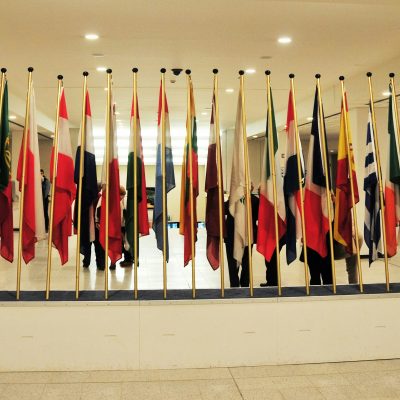Taïwan et l’autonomie stratégique européenne

Après l’Europe, c’est en Asie que les bruits de bottes et d’avions se font entendre tous les jours un peu plus : du 11 au 15 avril, la Chine vient d’effectuer autour de l’île des manœuvres militaires d’une ampleur inégalée, mimant l’encerclement et peut-être une prochaine attaque. Après l’invasion de l’Ukraine par la Russie, assiste-t-on à une nouvelle guerre entre démocraties et régimes autoritaires ? Faudra-t-il aller défendre Taïwan en cas d’attaque de la Chine ?
A première évidence, la réponse est positive. Tout l’Occident s’est même indigné que le président français Emmanuel Macron ait osé introduire un doute, lors de sa visite en Chine : « La pire des choses serait de penser que nous devrions être suivistes et nous adapter au rythme américain et à une surréaction chinoise. » Cette profession de foi en faveur d’une autonomie stratégique européenne par rapport aux Etats-Unis n’est pas nouvelle de la part de la France. Mais dans le contexte de la guerre en Ukraine, du voyage en Chine et des intimidations de Pékin contre Taïwan, les propos du chef de l’Etat ont eu des allures de sacrilège atlantique. Une fois la polémique retombée, que peut-on en conclure ?
D’une part, il est absolument évident que la démocratie taïwanaise doit être défendue. Mais d’autre part, il est tout aussi vital de ne pas remettre en cause les conditions de la sécurité de l’île, et donc de la paix dans sa région. Or depuis des décennies, la stabilité de Taïwan repose sur une ambiguïté diplomatique respectée par les trois acteurs décisifs : Taïwan, la Chine, les Etats-Unis. Ce compromis repose sur trois interdits : interdiction de déclarer l’indépendance pour Taïwan, interdiction de reconnaître l’indépendance de l’île pour les USA, interdiction pour la Chine d’attaquer militairement l’île pour la réunir au continent. Ni indépendance, ni invasion donc.
Or depuis quelques années, cette formule délicate est remise en cause aussi bien par la Chine que par les Etats-Unis. Pékin a multiplié les gesticulations agressives sur Taïwan. Dans son discours d’ouverture du 20° congrès du Parti communiste, Xi JinPing a été clair sur le fait qu’il ne renoncera jamais au retour de Taïwan dans la Chine et qu’il ne promettrait jamais de renoncer à l’usage de la force pour atteindre cet objectif. De leur côté, les Etats-Unis jouent avec l’ambiguïté : Nancy Pelosi, alors présidente de la chambre des Représentants, a visité Taipei pour la première fois en août 2022, suivie par une délégation de sénateurs américains. Et la présidente de Taïwan a été reçue « en transit » aux Etats-Unis, non pas certes par Joe Biden – ce qui serait une ligne rouge absolue – mais par le président de la Chambre des représentants des États-Unis, Kevin McCarthy.
Déjà en 2016, Donald Trump, lors de sa campagne électorale, avait suscité l’effroi en se demandant publiquement pourquoi « nous devons être liés à la politique d’une Chine unique ». Devant ce qui apparaissait comme un tournant vers une reconnaissance officielle de Taïwan, Pékin protesta, et le département d’Etat calma immédiatement le jeu en expliquant que la position américaine sur Taïwan restait inchangée depuis 40 ans. Mais désormais les positions évoluent des deux côtés et nous nous retrouvons sous la dialectique de la poule et de l’œuf : tous les Occidentaux considèrent que les raidissements américains sont une réponse à l’agressivité grandissante de la Chine, et inversement pour les Chinois qui s’insurgent devant les « provocations américaines ».
C’est sans doute cette spirale d’escalade qui explique le refus d’Emmanuel Macron de voir l’Europe condamnée au suivisme des Etats-Unis : pourquoi ceux-ci, sous un président démocrate, Joe Biden, prennent-ils le risque de sortir de plus en plus de l’ambiguïté, en allant à la limite extrême de ce que serait une reconnaissance politique de Taïwan, et au risque d’une crise majeure avec la Chine ? Pourquoi ne pas s’en tenir au statu quo ante, en rappelant la ligne rouge sur la non-agression de Taïwan, en laissant donc l’entière responsabilité de l’insécurité régionale à la seule politique chinoise ?
Autrement dit, la perplexité est nécessaire s’il s’agit de s’interroger sur les ressorts réels de la stratégie américaine. Elle est en revanche injustifiée s’il s’agit de nuancer notre défense de la démocratie, à Taïwan ou ailleurs. Il ne fallait donc pas mélanger les choses : en donnant à croire que la France émettrait des réserves sur la démocratie et des bienveillances à l’égard de la position chinoise, le président a mérité ses critiques. Mais en rappelant que l’Europe ne peut pas en tous lieux et dans tous les cas suivre sans réfléchir les politiques et les décisions américaines, il avait mille fois raison.
La démocratie est effectivement la cible des régimes autoritaires russe et chinois. Mais elle peut être aussi un argument des fauteurs de guerre, comme ce fut le cas en Irak en 2003, et comme ce pourrait être possible à l’avenir si l’on recommence à transformer les confrontations stratégiques légitimes en lutte finale idéologique.




